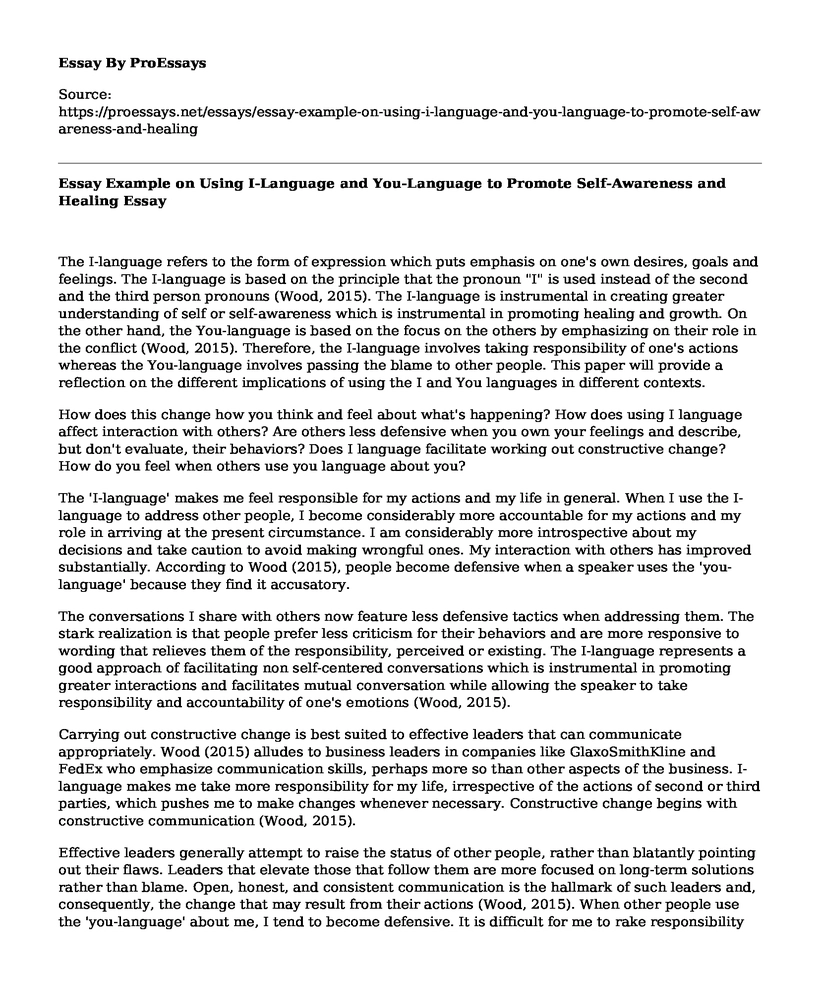The I-language refers to the form of expression which puts emphasis on one's own desires, goals and feelings. The I-language is based on the principle that the pronoun "I" is used instead of the second and the third person pronouns (Wood, 2015). The I-language is instrumental in creating greater understanding of self or self-awareness which is instrumental in promoting healing and growth. On the other hand, the You-language is based on the focus on the others by emphasizing on their role in the conflict (Wood, 2015). Therefore, the I-language involves taking responsibility of one's actions whereas the You-language involves passing the blame to other people. This paper will provide a reflection on the different implications of using the I and You languages in different contexts.
How does this change how you think and feel about what's happening? How does using I language affect interaction with others? Are others less defensive when you own your feelings and describe, but don't evaluate, their behaviors? Does I language facilitate working out constructive change? How do you feel when others use you language about you?
The 'I-language' makes me feel responsible for my actions and my life in general. When I use the I-language to address other people, I become considerably more accountable for my actions and my role in arriving at the present circumstance. I am considerably more introspective about my decisions and take caution to avoid making wrongful ones. My interaction with others has improved substantially. According to Wood (2015), people become defensive when a speaker uses the 'you-language' because they find it accusatory.
The conversations I share with others now feature less defensive tactics when addressing them. The stark realization is that people prefer less criticism for their behaviors and are more responsive to wording that relieves them of the responsibility, perceived or existing. The I-language represents a good approach of facilitating non self-centered conversations which is instrumental in promoting greater interactions and facilitates mutual conversation while allowing the speaker to take responsibility and accountability of one's emotions (Wood, 2015).
Carrying out constructive change is best suited to effective leaders that can communicate appropriately. Wood (2015) alludes to business leaders in companies like GlaxoSmithKline and FedEx who emphasize communication skills, perhaps more so than other aspects of the business. I-language makes me take more responsibility for my life, irrespective of the actions of second or third parties, which pushes me to make changes whenever necessary. Constructive change begins with constructive communication (Wood, 2015).
Effective leaders generally attempt to raise the status of other people, rather than blatantly pointing out their flaws. Leaders that elevate those that follow them are more focused on long-term solutions rather than blame. Open, honest, and consistent communication is the hallmark of such leaders and, consequently, the change that may result from their actions (Wood, 2015). When other people use the 'you-language' about me, I tend to become defensive. It is difficult for me to rake responsibility when such language is used because I may seek a scapegoat or an abstract factor to accord the blame.
Conclusion
The use of I-language is better compared to the use of You-language because the former facilitates greater responsibility and accountability of one's actions and words. When speakers use the I-language they facilitate greater participation of other parties and prevents potential use of defensive language or conversations growing out of control. Constructive change can be attained when the I-language is used because people tend to shoulder greater responsibility and accountability while preventing defensive arguments to emerge.
References
Wood, J. T. (2015). Interpersonal communication: Everyday encounters. Nelson Education.
Cite this page
Essay Example on Using I-Language and You-Language to Promote Self-Awareness and Healing. (2023, Mar 28). Retrieved from https://proessays.net/essays/essay-example-on-using-i-language-and-you-language-to-promote-self-awareness-and-healing
If you are the original author of this essay and no longer wish to have it published on the ProEssays website, please click below to request its removal:
- Essay on Personality Development Behavior Relative to Dominican Republic People
- Communication Strategy Campaign for Patients With Post-traumatic Stress Disorder (PTSD) - Essay Sample
- Essay Sample on 'Beauty Standards': A Bane for Women's Mental and Physical Health
- Essay Example on Ageing: A Life Journey of Changes and Maturity
- The Leadership Styles Survey and the Enneagram - Paper Example
- Essay on Benjamin Netanyahu's Leadership in the Israeli Parliamentary System: Overcoming Perils of Presidentialism
- Dogs Influence the Evaluation of Psychotherapists - Essay Sample







